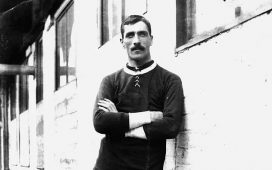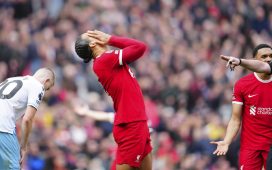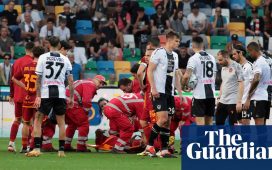Manchester United can play worse than they did against Liverpool. Yes, yes, I know, but before you click out please stick with me for a second. Though their defending was as bad as defending can be – again – until things got silly they attacked with speed, cohesion and imagination, not something said often.
The result, then, was not a factor of performance but of opponent, a serious beating long in the post, dispensed by a serious team missing two-thirds of their first‑choice midfield. Which is to say United have rarefied depths still to plumb – and with games against Atalanta, Manchester City, Villarreal and Chelsea imminent, history may soon repeat farce as slapstick.
Responsibility for this rests with Ole Gunnar Solskjær, because the team and staff are his. But the focus on the coaching exculpates players who have earned a reckoning. Every morning and before every game, they perform a rondo, a small-sided drill in which one group keeps the ball from another – something United struggle to do against opponents less skilled than their teammates.
The skills required are so basic and fundamental – pass and move, find space and make an angle – that the players should be able to transfer them on to the pitch by themselves. It is unlikely Alex Ferguson ever told Roy Keane and Paul Scholes how to “progress the ball” because they are international footballers, and none of Solskjær’s squad should need such instruction either; the problem here is not one of ability but of mentality.
It is for this reason that things have descended so far, so fast: Solskjær’s players are failing to apply basic principles of running and thinking. They cannot hide behind the manager when they are ignoring the basic standards of professionalism expected of every person, in every job.
Solskjær is often criticised for relying on vibes, asking his team to express themselves with no structural guidelines, but this is just not true. He did not, for example, spend half-time of the Young Boys game telling his 10 men to spend the next three-quarters of an hour defending their box. But if his instructions don’t manifest on the pitch then they’re not good instructions, and everything we’re seeing now suggests the players have given up on him.
This is nothing strange. Because most managers are sacked, there comes a point in most tenures when all hope expires and it is clear that a relationship must end: for David Moyes it was 81 crosses against Fulham, for Louis van Gaal it was limp defeat at Stoke, and for José Mourinho it was Champions League elimination by Sevilla.

Although there are those who have felt that way about Solskjær all along, improvement has been steady until recently and the prospect of more did not vanish until the recent defeat at Leicester – the uplifting Atalanta comeback was clearly unsustainable.
After that game, Bruno Fernandes – the team’s totem – was candid in his assessment. “We have a lot to improve on,” he said, “and the coach also knows there has to be some improvement at their end but that is part of football … His ideas might be right or wrong, but we’re sticking with it until the end.”
Well, the end is surely imminent; Ferguson once said that when it goes it goes quickly, and though he was talking about title chases he could have been talking generally. Football being football, any decision to relieve Solskjær of his duties would barely be a decision at all because the Glazers, who have drained more than £1bn from the club without putting a penny in, will take a view. As things stand, United are well placed to make the knockout stages of the Champions League and to qualify again next season, a position the owners will be loth to lose, nor will they want players mentally checking out or making other plans, given the price of speculating on replacements.
Ultimately, Solskjær has failed because he has made too many big-picture errors. As caretaker manager he was ruthless in shedding Marouane Fellaini and Romelu Lukaku, but went soft on Paul Pogba and Anthony Martial once permanently ensconced; he chose not to prioritise the controlling midfielder United have needed since Michael Carrick retired, despite retaining Carrick as a coach; though accused of being a “Fergie tribute-act”, he failed to mitigate weaknesses by employing the best possible staff; and he evaluated Harry Maguire as the player he wanted him to be, rather than the player he is.
The Fiver: sign up and get our daily football email.
But the travesty he inherited should not be forgotten, and in less than three years Solskjær has turned a miserable squad into an excellent one. Whoever replaces him will have plenty to work with.
Sometimes, though, people simply run out of ideas. When Brad Gilbert ended his relationship with Andre Agassi, he explained that he had used all the tools in his box – and he was the best coach in the world at the time.
Sadly for Solskjær, United now need a new box with new tools, and if they are not vigilant in seeking one, Sunday’s beating will soon feel like a birthday present.








